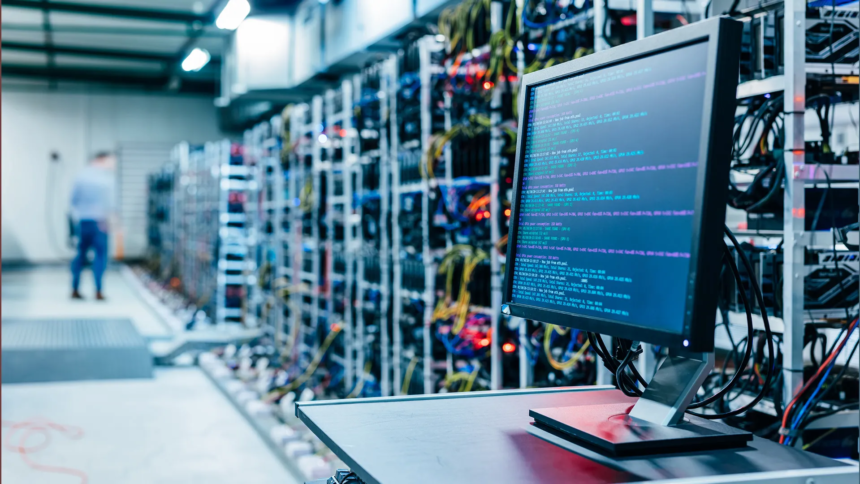Bitcoin mining is the process through which new bitcoins are created and transactions are verified and added to the public ledger, known as the blockchain. It involves solving complex cryptographic puzzles using computational power. Bitcoin miners play an essential role in the Bitcoin network, ensuring its security, transparency, and decentralization. Bitcoin mining is not only vital for the issuance of new bitcoins but also for the overall operation of the entire cryptocurrency system.
Key Takeaways
- Bitcoin mining uses computational power to verify transactions and create new bitcoins.
- Miners solve cryptographic puzzles in exchange for rewards in bitcoins.
- The mining process is essential for maintaining the blockchain and decentralizing the currency.
- Example: When a Bitcoin transaction is initiated, miners work to validate it by solving a cryptographic puzzle, adding it to the blockchain.
What is Bitcoin Mining?
Bitcoin mining is a critical process that ensures the integrity and security of the Bitcoin network. The term “mining” may seem similar to traditional mining, but instead of digging for physical resources, Bitcoin miners use powerful computers to solve cryptographic puzzles. These puzzles are part of the Proof of Work (PoW) consensus mechanism, which is essential to add new blocks to the blockchain.
In essence, mining helps to validate and verify Bitcoin transactions, and miners are rewarded for their work with newly minted bitcoins and transaction fees. This process ensures that Bitcoin remains secure and operates without any central authority, making it a decentralized form of digital currency.
How Bitcoin Mining Works
The Bitcoin mining process begins when a transaction is initiated. The miner’s role is to verify this transaction and add it to the blockchain, a public ledger containing all the transactions ever made on the Bitcoin network. Here’s how it works:
- Transaction Initiation: A user initiates a Bitcoin transaction, sending cryptocurrency to another wallet.
- Mining Process: Miners use high-powered computers to solve complex mathematical puzzles (cryptographic hash functions). These puzzles require immense computational power and are designed to be challenging but solvable over time.
- Block Creation: Once the miner successfully solves the puzzle, a new block is added to the blockchain, containing the transaction information and the cryptographic proof of the puzzle being solved.
- Block Confirmation: The newly added block is broadcasted to the network, and other miners verify the validity of the new block. Once it’s confirmed, the transaction is considered complete, and the user’s wallet is updated.
- Reward: In exchange for their efforts, miners are rewarded with newly minted bitcoins (block rewards) and any transaction fees associated with the transactions they’ve processed. The current reward for mining a block is 6.25 bitcoins (as of 2021), which halves approximately every four years in an event called the halving.
The Role of Miners in the Bitcoin Network
Miners play an essential role in keeping the Bitcoin network secure, decentralized, and functioning smoothly. Their work helps to:
- Maintain Security: By solving cryptographic puzzles and validating transactions, miners prevent fraud and double-spending attacks. Since each block is cryptographically linked to the previous one, changing a single transaction would require changing the entire blockchain, making it nearly impossible to alter past transactions.
- Decentralization: Bitcoin operates without a central authority, and mining ensures that no single party has control over the network. The decentralized nature of Bitcoin is a core value of the cryptocurrency, and mining helps to uphold it.
- Confirm Transactions: As transactions are submitted, miners are the ones who confirm and process these transactions. They ensure that funds are transferred securely between users.
- Issue New Bitcoins: Through mining, new bitcoins are introduced into circulation. This process is gradual, with the total supply of Bitcoin capped at 21 million coins. The halving event occurs approximately every four years to reduce the block reward, limiting the number of new bitcoins created over time.
Example of Bitcoin Mining
Let’s take an example to understand Bitcoin mining better. Alice wants to send Bob 1 Bitcoin. She initiates the transaction, and it enters the Bitcoin network. Miners like Charlie and David start working on solving a cryptographic puzzle related to this transaction.
Once Charlie successfully solves the puzzle, a new block containing Alice’s transaction is added to the blockchain. Charlie is rewarded with 6.25 bitcoins for his efforts. The transaction is confirmed, and Bob receives the 1 Bitcoin in his wallet.
The Costs and Challenges of Bitcoin Mining
Bitcoin mining is resource-intensive and comes with significant costs:
- Energy Consumption: Mining requires vast amounts of electricity. Powerful mining rigs run continuously, consuming large amounts of energy. As a result, Bitcoin mining has faced criticism for its environmental impact.
- Hardware Requirements: Miners must invest in specialized hardware known as ASICs (Application-Specific Integrated Circuits) to have a competitive edge in solving cryptographic puzzles. These devices are expensive but necessary to mine Bitcoin effectively.
- Mining Difficulty: As more miners participate in the network, the difficulty of the puzzles increases. This means that it becomes harder to solve the puzzles and earn rewards. Mining difficulty adjusts every 2,016 blocks to ensure that new blocks are created approximately every 10 minutes.
The Future of Bitcoin Mining
As the Bitcoin network evolves, several changes will affect Bitcoin mining:
- Block Reward Halving: Every four years, the block reward is halved. This event reduces the amount of new bitcoins introduced to the market and increases the scarcity of the currency.
- Technological Advancements: As technology improves, more efficient and powerful mining hardware will likely emerge, reducing energy consumption and costs associated with mining.
- Regulatory Changes: Governments around the world are beginning to regulate cryptocurrency activities, including Bitcoin mining. Miners will need to adapt to new regulations that may affect where and how they mine.
Bitcoin mining is the backbone of the Bitcoin network, ensuring security, decentralization, and the creation of new bitcoins. Although it comes with high costs and environmental challenges, it remains a crucial aspect of the cryptocurrency ecosystem. Understanding how mining works and its importance is essential for anyone interested in Bitcoin and other cryptocurrencies.





